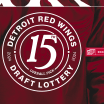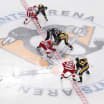Have you ever known a new driver who didn't realize that different fuels at the gas station were for different cars? And perhaps this driver filled up her non-diesel car with diesel fuel. Needless to say, when she woke up the next morning, her car would not start.
We can look at our bodies in a similar way. For strong performance, you need a strong diet. For athletes, here are some ways to avoid using the wrong fuel:
Priority Health Wellness Blog
Avoiding the pitfalls of performance

© Dan Mannes
By
Lisa McDowell / Team Sports Nutritionist, Detroit Red Wings
Problem: Swear Off the Car-Window Diet
Every bite you take of that gas station food, every wrapper you crinkle up and throw on the passenger seat before you even arrive home, is indicative of a missed opportunity to be fueling your success.
You must put as much effort into preparing your meal as you do for preparing for a game. Having no cooking skills and relying on fast food can make a great athlete average due to the negative impact poor ingredients have on performance. When I first started teaching our prospects how to cook, I realized how tough it was for them to maneuver the environment. If you drive around most cities, it is difficult to find healthy options.
Instead, we are barraged by suboptimal choices on every street corner. We are tempted by the convenience, affordability and addictive taste of the cheap ingredients used in fast food. Many fast food restaurants have long, unfamiliar ingredient lists--which include names that are difficult to pronounce and products that are unlikely to be stocked in your cabinet. Most fast food choices result in over consuming food that is high in sodium, trans-fatty acids, simple sugars, saturated fat and calorically dense ingredients made with many artificial colors and flavors.
Unhealthy diets affect the blood flowing through arteries within hours. Studies have shown that when the arteries stiffen as a result of consuming junk food, blood flow is cut in half. This blood flow reduction does not help an athlete deliver the vital oxygen the muscles demand.
Several restaurant chains also purchase food that has been grown with chemicals and contains genetically engineered ingredients from large mono-crop factory farms. Many purchase sources of protein that have been raised with hormones, antibiotics and/or other drugs. In fact, the NFL issued an alert warning players to avoid consuming meat from China and Mexico. The league had evidence that some of the meat contained high levels of clenbuterol, which is an anabolic agent that is considered a banned substance in the NFL. Some of the players made jokes about needing to go vegan while on vacation or playing in Mexico.

© Dan Mannes
Many athletes do not have basic cooking skills, so they rely on convenience food for meals. Cooking has become a vital skill to support athletic performance. The skill to prepare the meal, from start to finish, allows athletes to choose every aspect of the quality of the food they are consuming. Taking control of your plate with purposeful ingredients simply contributes to the process of allowing athletes to achieve their genetic potential. In addition, sharing a meal with family or friends helps decrease the stress hormone, cortisol.
Solutions: Learn to cook whole foods from scratch and avoid processed ingredients that make it too easy to over consume calories, sugar and fat. If you simply cannot take the time to cook, then find a local restaurant that supports transparency and provides nutrition information at the point of purchase. Companies committed to sourcing better quality products proudly display this information for their customers. A few examples of restaurants offering healthier choices include Chipotle, Freshii, Pret a Manger, Panera Bread, Shake Shack, Lyfe Kitchen, Sweet Green and Elevation Burger.
Problem: Frequent Sleep Debt
Sleep is the secret sauce to peak recovery. We only move forward and make gains when we pay attention to recovering from workouts. Sleep provides our bodies with the foundation to optimize our next performance by improving reaction time, pain tolerance, memory and immune function.
Elite athletes need more sleep than they're getting. Due to higher energy demands, athletes need to be sleeping more than the average person. Studies reveal a decrease in performance and reaction time by 12-15% after a poor night's sleep. A good night's sleep, however, brings many positives, including a 68% reduction in injuries when athletes sleep eight or more hours per night.

© Dan Mannes
We need sleep to help eliminate cellular byproducts in our brains. These result from the demands of our brain's neural networks to constantly organize new information and connections--which happens all day long. We must also be asleep to repair and recover muscle damage. During the night, we produce testosterone and growth hormone, allowing our bodies to grow and repair stronger and more quickly in order to take on the next day with even greater power.
Solutions: Protect your precious sleep hours like your career depends on it. Aim for 8-10 hours per night if you are a serious athlete. Hardwire a nighttime routine that begins the minute you wake up. Sunlight helps with cortisol regulation so start each day outdoors with five minutes of sunlight. Try drinking a shot of Montmorency tart cherry juice. Cherries naturally contain melatonin and can help regulate sleep cycles.
Enjoy the benefits of soaking in an Epsom salt bath for 15 minutes to decompress as well as to absorb a little magnesium, helping promote a positive sleep process. Eliminate the use of technology and television before bed as the negative impact from the blue lights on the screens can seriously deduct from your sleep hours. Blue light interferes with melatonin production, which disrupts sleep cycles. Try meditating, yoga, reading a book or cuddling with a loved one, instead. Keep your bedroom dark, cool and quiet. Don't make it a habit to compromise when it comes to choosing between sleep and competing offers. Remember, sleeping is working and sleeping is recovering. You must not shortchange the Sandman.
Problem: Don't be the King of Beer
In many sports, including hockey, there is a long-standing tradition to celebrate victories and mourn defeats with a few beers. What many great athletes don't realize is that drinking in excess after a game reduces muscle repair, upper body strength and quality sleep hours. The majority of studies showing a decline in performance were conducted on what many would consider binge drinking (roughly 4.6 cans or 3.5 pints of beer). Though for some, this may not be perceived as binge drinking as many athletes develop higher alcohol tolerance levels.
Continued use of alcohol hurts performance by reducing cognitive sharpness. Alcohol also decreases muscle glycogen availability, which limits endurance. Additionally, alcohol contributes a significant excess of calories. There is a reason the term "beer belly" exists. Elite athletes find balance with alcohol intake and recognize the proper time and place to imbibe without harming training and performance.
Solution: Drink alcohol in moderation and avoid binge drinking post-game to minimize power loss. The Holy Grail of training is the optimization of recovery to enable a stronger tomorrow. Proper recovery leads to improved oxygen delivery to muscles. Stronger muscles have more mitochondria. Having more mitochondria means having more energy (ATP). Don't be the athlete with more beer and less muscle mitochondria.


















































